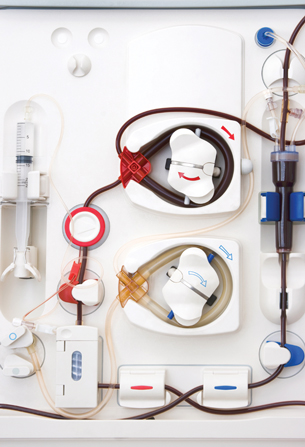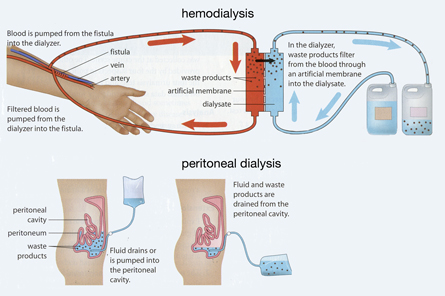Module 8 Intro
1. Module 8 Intro
1.52. Page 4
Module 8—Circulation, Immunity, and Excretion
 Read
Read
Kidney Problems

© beerkoff/shutterstock
The excretory system can experience many different problems. You can experience urinary tract infections where your immune system and antibiotics will fight the infection. You can also experience kidney stones, a crystallization of excess calcium in the urine. These can be painful to excrete and may cause damage to the kidney.
Kidneys can also be damaged by kidney infections, high blood pressure, diabetes, or blunt force trauma to the lower back where the kidneys are located. Arteriosclerosis can reduce blood flow to the kidneys, and tubules can become blocked. Irreversible damage to the kidneys may require a person to undergo dialysis or a kidney transplant.
Dialysis is the diffusion of dissolved substances through a mechanical semipermeable membrane. Technology based on the same principles of filtration in the kidney has been developed to aid people with kidney disfunction.
Read pages 319 to 325 of the textbook to learn more about these problems and treatments.
 Self-Check
Self-Check
SC 3. One of the effects of mercury poisoning is the complete stoppage of the kidney function. What would be the first symptom of kidney function shutdown?
SC 4. With kidney failure, urea levels accumulate in the blood, affecting the absorption of water from the large intestine into the blood. Explain the effect of the high urea concentration in the plasma on water reabsorption in the large intestine and on the water balance in the body cells.
SC 5. After an episode of severe bleeding, the production of urine ceases temporarily. Identify the hormone involved, and describe its action in this situation.
SC 6. What hormone is involved in the homeostatic reabsorption of water from the urine in the kidney tubule?
 Self-Check Answers
Self-Check Answers
SC 3. Urine production would stop, so the person would not urinate. The body would swell due to the excess water in the body.
SC 4. There is an increasing amount of water absorbed by the intestine because the blood is becoming increasingly hypertonic with the increasing levels of urea in the blood. The water inside the cells diffuses into hypertonic blood, causing dehydration of the cells.
SC 5. The hormone aldosterone is secreted when blood volume drops. Aldosterone stimulates the distal convoluted tubule to reabsorb more salt, and water follows by osmosis. This leads to a drop in urine production.
SC 6. The hormone involved in the reabsorption of water by the tubule is ADH.
 Try This
Try This
TR 2. Hemodialysis and Peritoneal Dialysis
When kidney failure occurs, blood plasma is said to become uremic, because urea molecules accumulate to dangerous levels. Imbalances in other substances, such as salts and hydrogen ions, also occur.
Dialysis is a medical procedure in which the composition of the plasma can be corrected through simple diffusion. Dialysing fluid (dialysate) is separated from the patient’s blood (uremic plasma) by thin semi-permeable membranes. Molecules and ions diffuse into or out of the patient’s plasma, depending upon the composition of the dialysate. Thus, careful formulation of dialysate is the key to correcting the composition of uremic plasma.
In hemodialysis, diffusion occurs across artificial membranes. In peritoneal dialysis, it occurs across the intestinal lining (peritoneum). These procedures are illustrated.

Adapted from Inquiry into Biology (Whitby, ON: McGraw-Hill Ryerson, 2007), BLM 9.3.5. Reproduced by permission.
Go to your Lesson 9 Assignment to complete this activity.
 Discuss
Discuss
Organ donation, such as that necessary for kidney transplantation, is an often-misunderstood process. It is a process critical for the health and well-being of many Canadians. The number of available kidneys from donors is far less than those needed by individuals who have kidney disease. The desperation that those on waiting lists face often forces them to take drastic measures.
Do a web search to find out what lengths people will go to to prolong their lives by obtaining a new kidney. Post your findings in the discussion area and read other postings. Does the research surprise you? Jot down a few notes for your own information in your course folder.